Of course, mythology isn’t always about the heroes and saviors who come in clutch last second and steal the day.
Sometimes, it’s also about the tricksters and jokers.
In Irish mythology, the one having all the fun was Bres, a legendary king despised by all and loved by none.
Table of Contents
What is Bres the God Of?
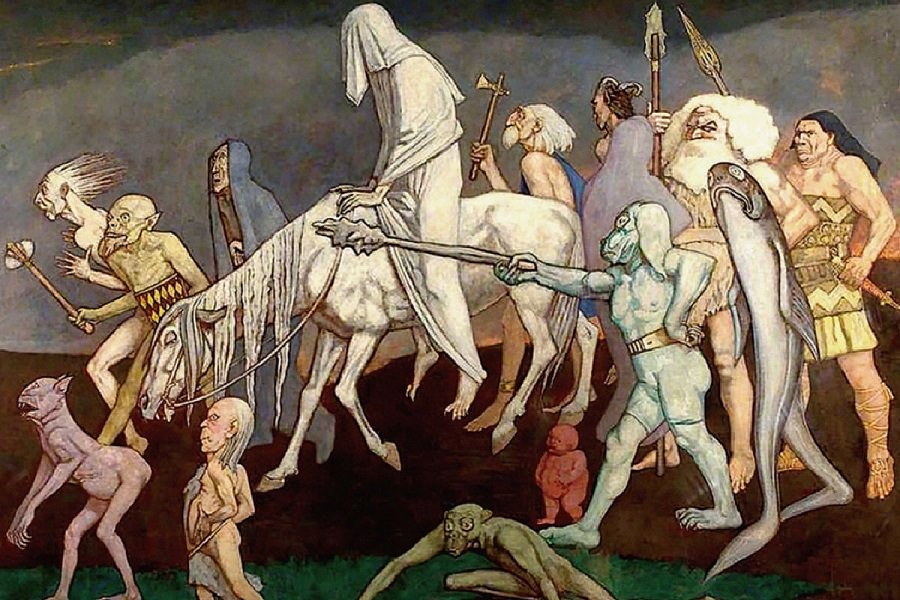
Calling Bres a god and placing them among other Celtic gods and goddesses would be, quite frankly, an unfair statement.
At his peak, Bres was simply a legendary mortal. He had an unlikely rise to the top as the King of the most potent group of supernatural beings in Irish mythology known as the Tuatha de Danann, which roughly translates to “the Tribe of the Goddess Danu.”
For reference, compare them to the Olympian Gods of Greek mythology or the Aesir gods – a special group of Norse gods from Norse mythology.
Alongside not being remarked as a god, Bres was also known to be a poor king who couldn’t fulfill any of his duties. Instead, he imposed his selfish ideologies onto those around him (mainly the Tuatha de Danann), contributing to his infamy and eventual downfall.
READ MORE: 41 Greek Gods and Goddesses: Family Tree and Fun Facts
In the Name
Like his polarized nature, Bres went by many names.
He was often referred to as “Eochu Bres.” “Bress”, or even “Euochaid”. Though many early scribes tried to make up for his lousy PR by saying his name was rooted in the word “beautiful,” it might not be the case.
In fact, Bres’ name might have come from an ancient Irish root that linked it to the word “uproar” or “fight.” This aligns with Bres’ actual personality and the discordant noise he seemed to emanate whenever he was around.
Meet the Family
If we were to look at Bres’ family tree, we could immediately justify 50% of the issues he suffers from.
After all, Bres was Fomorian; that meant that he evolved from the ugliest bunch of giants in Irish mythology. This, of course, didn’t help him make many friends. Bres’ father was Elatha, a Fomorian prince, and his mother was Ériu. Elatha and Ériu descended from Delbaeth, the King of the Fomorians.
In other sources, Bres’ father is stated to be Balor, who possessed a third eye that could unleash destruction on those unlucky enough to even look at it.
So basically, Balor is the perfect fit to be Bres’ actual dad. Also, we suggest you remember Balor; his name is sure to come up soon again.
Bres was married to Brigid (or Brig), daughter of the Dagda (the prime chieftain of the Tuatha de Danann). Together, they had a son named Ruadan, who was the victim of an unfortunate assassination.
Due to an abundance of beings in Irish mythology having the same name, things in many sources sometimes get confusing. If we consider such sources, Bres could actually be considered the Dagda’s brother.
It might also be that Bres and Brig had three sons besides Ruadan. But things get super obscure at this point, and one might prefer to stick with the most comprehensible of the tales as it messes up the entire dynamic of Irish mythology. After all, you can’t expect consistency in oral tales.
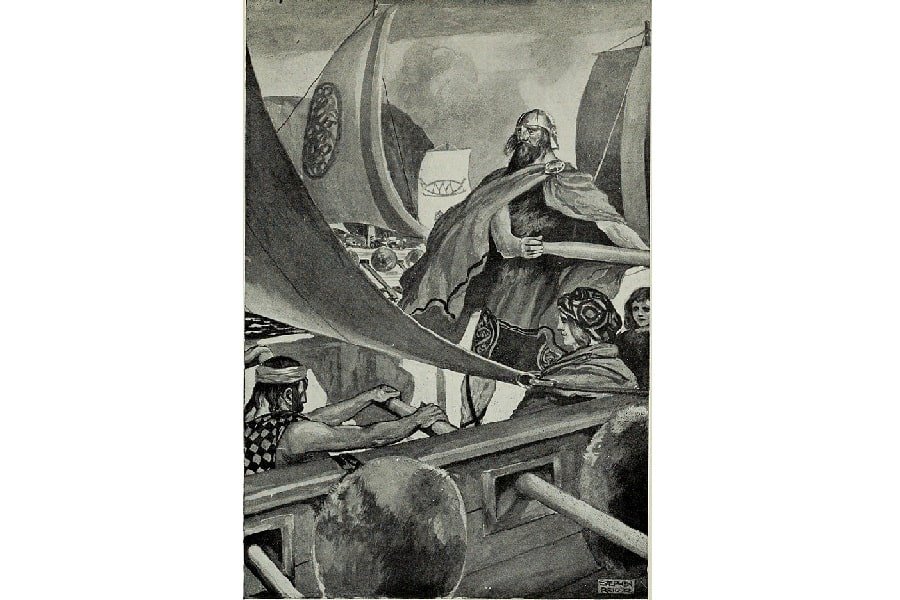
Brig and Bres
The divine pairing of Brig and Bres is written on the stars.
Every problematic guy has to have a girl by his side who yearns to fix him. The same can be said for Bres and his beautiful wife, Brig.
Though it is more of a Beauty and the Beast tale (with a much more lopsided twist). You can easily guess who is who in that case.
The relationship between Brig and Bres was discussed in a thesis that explores the “mythical pairing” between the two. There, it is concluded that the character of Bres in Irish mythology may be more complex and significant than is commonly understood.
His mythological relationships with Brig (which can often be metaphorical) point to a deeper connection to a sacred and primal nature.
It is also noted that the cult of Brig has recently gained popularity, while Bres has been largely forgotten.
Powers of Bres
As Bres was no full-time god or champion, he had no supernatural powers. Besides the power of pissing people off, of course.
Bres was exiled by the people the moment someone more perfect than him reappeared, and he wasn’t needed anymore. As a result, any talent he might’ve had was overlooked and discarded.
One thing that we must give to Bres, though, is his ability to get his homies to gather by his side. He must have had the hood appeal, with a consistent potential to convince people to do whatever he wanted. This would’ve painted him as a trickster like those trickster gods, which is more than enough explanation for how he is the way he is.
Alongside that, he was also considered a tyrant as he misused his powers as King and oppressed the Tuatha de Danann. This specific oppression required a great deal of power, which we definitely need to consider when talking about him.
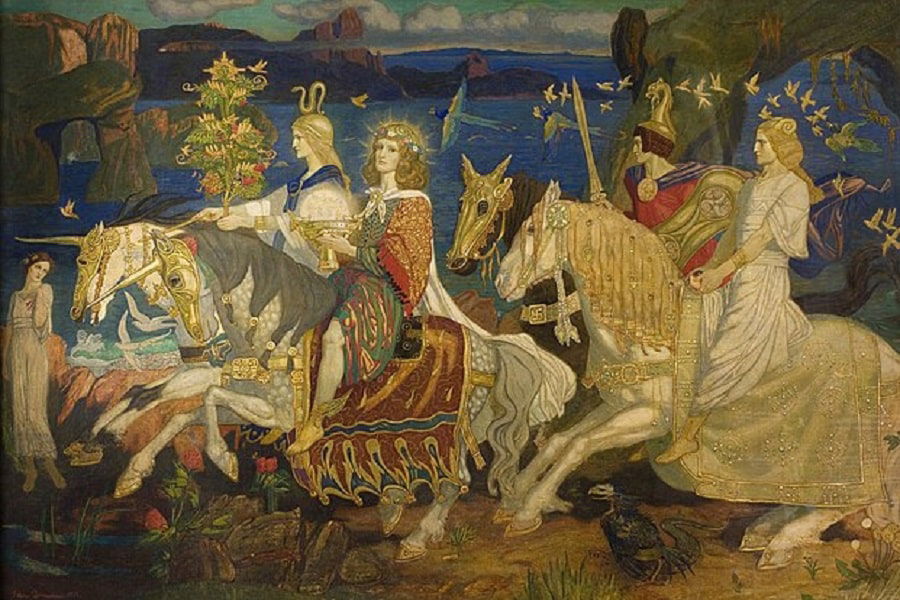
Before Bres: King Nuada
Now, on to the actual myths.
Bres’ involvement in Irish mythology begins in the reign of King Nuada, who was everything Bres was not.
Under Nuada’s reign, the Tuatha de Danann defeated the Fir Blog (first inhabitants of Ireland) in the First Battle of Magh Tuireadh. Unfortunately, this heroic King lost his arm in the battle to a Fir Bolg champion named Sren, which alarmed the daylights out of the Tuatha de Danann.
Why? The leader of the Tuatha de Danann simply had to be perfect. And we mean it in every sense of that word. Perfection was a quality that wasn’t taken lightly by the wonderchildren of ancient Ireland. As a result, their leader had to reflect every inch of that by being physically competent.
READ MORE: Ancient Civilizations Timeline: 16 Oldest Known Cultures From Around The World
And King Nuada losing a limb didn’t help his case much. Since the handless King had to be replaced with someone who could bring peace to the newly conquered lands of the Tuatha de Danann, the tribe held an emergency meeting. They decided to elect a new king.
The Crowning and Marriage of Bres
The Tuatha de Danann did elect a new king, but they decided to take it one step further.
Since the tribe had an avid hatred towards the Fomorian since the dawn of time, they decided to pacify things between themselves for the betterment of ancient Ireland. This shares an interesting parallel to the Aesir and Vanir pantheons in Norse mythology, where the formers did the same thing as the Tuatha de Danann and the Fomorians.
The Tuatha de Danann elected Bres, half-Fomorian and physically perfect in every way, to be the new King. In fact, they left no loose ends by offering Bres the promise of marriage. That too with Brig, potentially the most beautiful presence in the Tuatha de Danann.
They even swore fealty to him, the ancient equivalent of selling their souls and bodies to the man on the throne.
Of course, Bres wouldn’t complain about this. He accepted the offer, married Bres, and sat on the throne far above the Tuatha de Danann. With a grin and a pretty wife by his side, Bres looked down below at the tribe at his feet. Little did they know all hell was about to break loose.
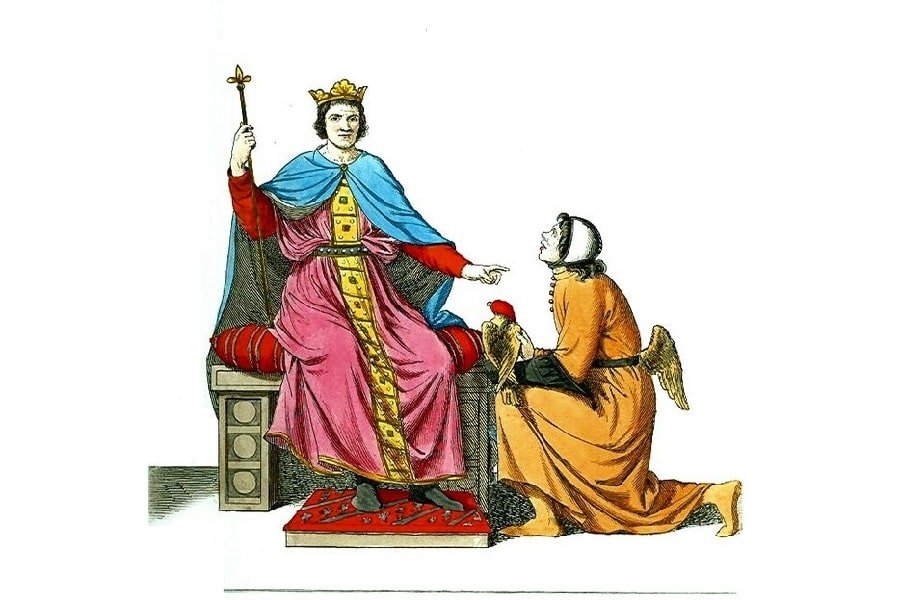
Bres Shows His True Nature
Turns out, Bres’ good side lasted as long as a Snapchat streak.
Depending on the version of the tale, the first thing that Bres did was let his greed get the better of him. Bres broke all laws of hospitality and imposed heavy taxes on the people of Ireland. It would’ve been wise if he had stopped at that, but he decided to take it one step further and cast his shadows upon the Tuatha de Danann.
He commanded Ogma, the Irish god of eloquence and knowledge, to chop down the trees and collect wood so the ovens of the kingdom could stay warm.
Bres even brought the Dagda to his heels by dispatching him to dig ditches on the ground so the overflowing streams could be contained. To really make you understand the magnitude of this acute insult against the gods, think about how it would’ve looked if King Midas from Greek mythology dragged Zeus by the ears down to Earth and made him clean dishes.
As Bres’ personal coffers grew and the food on his table flowed like rivers, he claimed the physical visage of being the most beautiful man in all of ancient Ireland, as the King of the Tuatha de Danann should be.
But alas, his “unkingly” actions would come back to bite him in the back.
The Exile of Bres
The Tuatha de Danann called an emergency council to decide the fate of this treacherous tyrant. Also, the fact that Bres was half-Fomorian didn’t particularly help in his defense. The tribe discussed that under his reign, their “breaths didn’t smell of ale” (talking about the lack of partying) and that their “knives were not greased.” However, they couldn’t directly retaliate against their King.
Why Does the Poet Curse Bres?
As a result, they hired a poet named Coirpre to passively tarnish Bres’ reputation further. And what better way to stain it than to drop the hottest diss track of the year?
Coirpre wrote a poem to curse Bres forever, where he sneaked in some bars about how the land hadn’t flourished since Bres took the throne. Of course, the good people of Ireland subsequently decided enough was enough.
They joined the Tuatha de Danann in an uprising against Bres to end it once and for all.
To add fuel to the fire, a physician named Dian Cecht replaced the former King Nuada’s missing arm with a silver one. This meant that Nuada was perfect once again and qualified enough to lead the Tuatha de Danann.
That was the last straw for everyone. The entire human population of planet Earth probably rejoiced when Bres’ crown was stripped from his head, and he was exiled to the lands beyond sight.
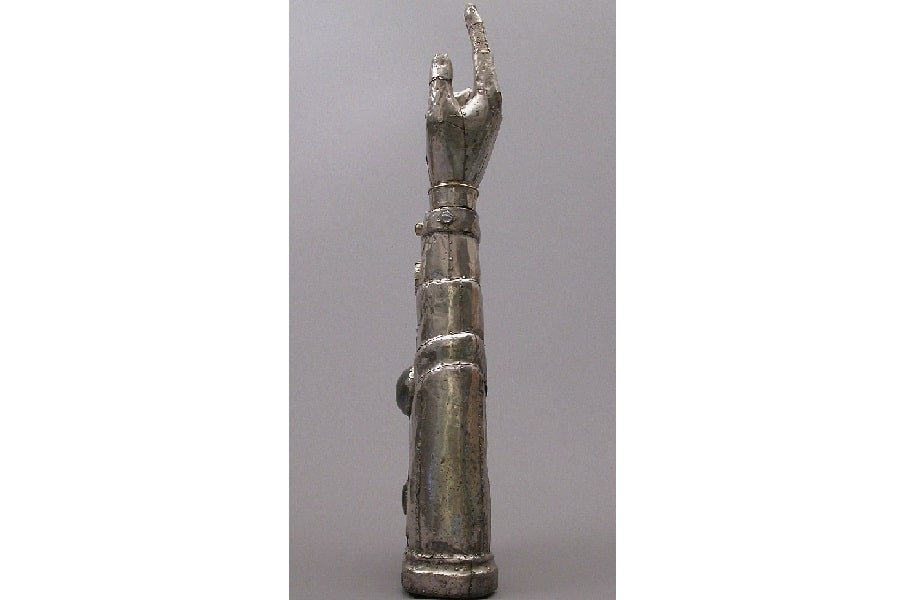
Bres Returns
Like a Velcro gone rogue, Bres just wouldn’t give up.
He decided to unleash the privileges of his bloodline and seek help from his father. However, upon arrival in Elatha’s palace, the Fomorian prince immediately rejected his appeal for war against the Tuatha de Danann.
Like the disappointed dad he was, Elatha stated that he deemed Bres’ unfit’ for help as he wasn’t able to keep what he once had.
Elatha’s refusal still wasn’t enough for Bres to throw in the towel.
He decided to travel to Balor. Remember him? The one who was the perfect fit to be Bres’ actual dad?
Of course, Balor’s maleficent personality synced with Bres’ evil intentions. They both agreed to join hands and wage war against the Tuatha de Danann for the throne in one of the greatest battles of Irish mythology.
Bres and the Second Battle of Magh Tuireadh
With all his might, Bres had kickstarted the ultimate battle between the Fomorians and the Tuatha de Danann.
Leading the Fomorian charge were Bres and Balor, while Lugh (an Irish hero) and Nuada took command of the Tuatha de Danann. As the two forces met on the war-ravaged battlefield, the Second Battle of Magh Tuireadh would start; and it would decide the fate of Ireland.
Shields splintered, and hammers clashed as the Fomorians, and the Tuatha de Danann tore each other apart. Bres swindled the lives of his foes with his trickery, while Balor wreaked havoc with brute force.
But their advances were quickly shut down by the combined might of Lugh, Nuada, and the Dagda.
Unfortunately, Balor managed to take the life of Nuada, leaving the Tuatha de Danann kingless (I bet they are pretty accustomed to it by now).
That must’ve unleashed a beast inside Lugh because he went utterly sicko mode and started laying the smackdown on the battlefield.
Lugh demolished Balor’s head with his sling, which transferred the command of the Fomorian forces to Bres. For Bres, however, his cowardly side began to show as his ranks started to get picked apart by the Tuatha de Danann. By the end of the battle, Bres found himself at the mercy of Lugh.
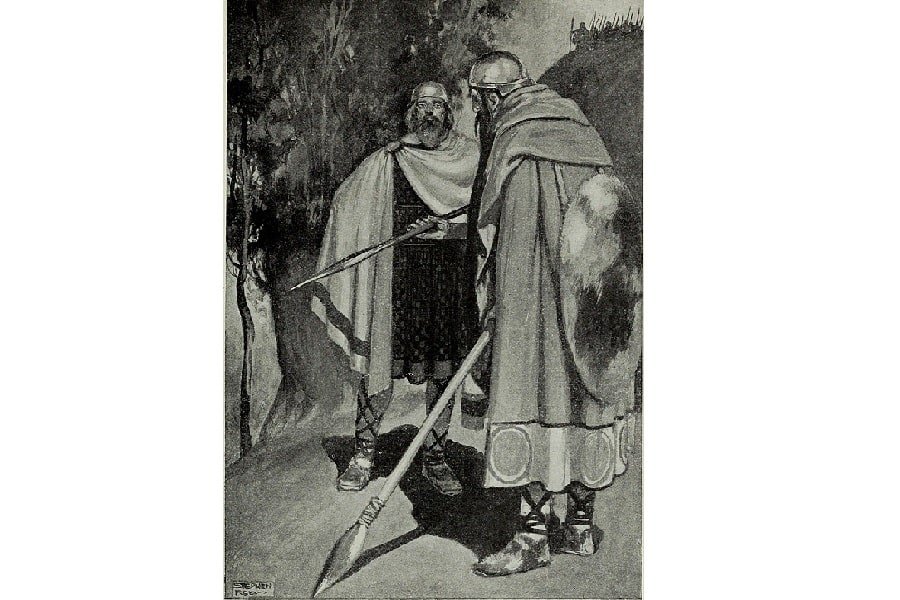
Bres’ Fate
This is where things get a bit tricky. What happens to Bres next? Did he die at the hands of Lugh? Did he survive?
According to some oral tales, Bres is actually slain by Lugh at the end of the battle. With that, the Tuatha de Danann are finally freed from the last chains of Bres’ tragic tyranny, and Ireland prospers again.
However, in other tales, Bres is spared by Lugh. The latter did this so Bres could teach the methods of agriculture to the Tuatha de Danann and the Irish population.
In doing so, Bres would forever be bound to teaching them, but he would constantly curse the Tuatha de Danann and the poet who dissed him.
Sometimes, Bres is said to have been locked away in a dungeon and made to do the same tasks he once imposed on the Tuatha de Danann. Regardless of how his fate is retold, Bres’ downfall is inevitable.
Legacy of Bres
Unfortunately, Bres is not a figure widely celebrated in popular culture.
This is in contrast to his Greek counterpart, Bellerophon (who was also a tragic hero who dug his own grave).
But he is mentioned every now and then in super-specific literature, but only under the shadow of other Irish figures such as Balor or Nuada when the topic of sad excuses for a king comes up.
Conclusion
Hubris is a dangerous thing.
We have seen it in major Shakespearean characters such as King Lear and Macbeth.
Though distant in time from the dramatic works of Shakespeare, Bres’ personality mirrors the downfall he suffered due to his actions.
His story is one that deserves to be retold over and over again to those who misuse power and think they can keep on getting away with it without reaction.
References
Gray, Elizabeth A., ed. Cath Maige Tuired. Vol. 52. Irish Texts Society, 1982.
Lincoln, Bruce. “Kings, Rebels, and the Left Hand.” Death, War, and Sacrifice: Studies in Ideology and Practice (1996): 244-58.
Stuff, We Are Star. “Brigit and Lugh.”
Warmind, Morten, and Morton Warmind. “Sacred Kingship among the Celts.” Proceedings of the Harvard Celtic Colloquium. Dept. of Celtic Languages and Literatures, Faculty of Arts and Sciences, Harvard University, 1992.
Banks, Mary Macleod. “Na tri Mairt, the three marts and the man with the withy.” Études celtiques 3.5 (1938): 131-143.